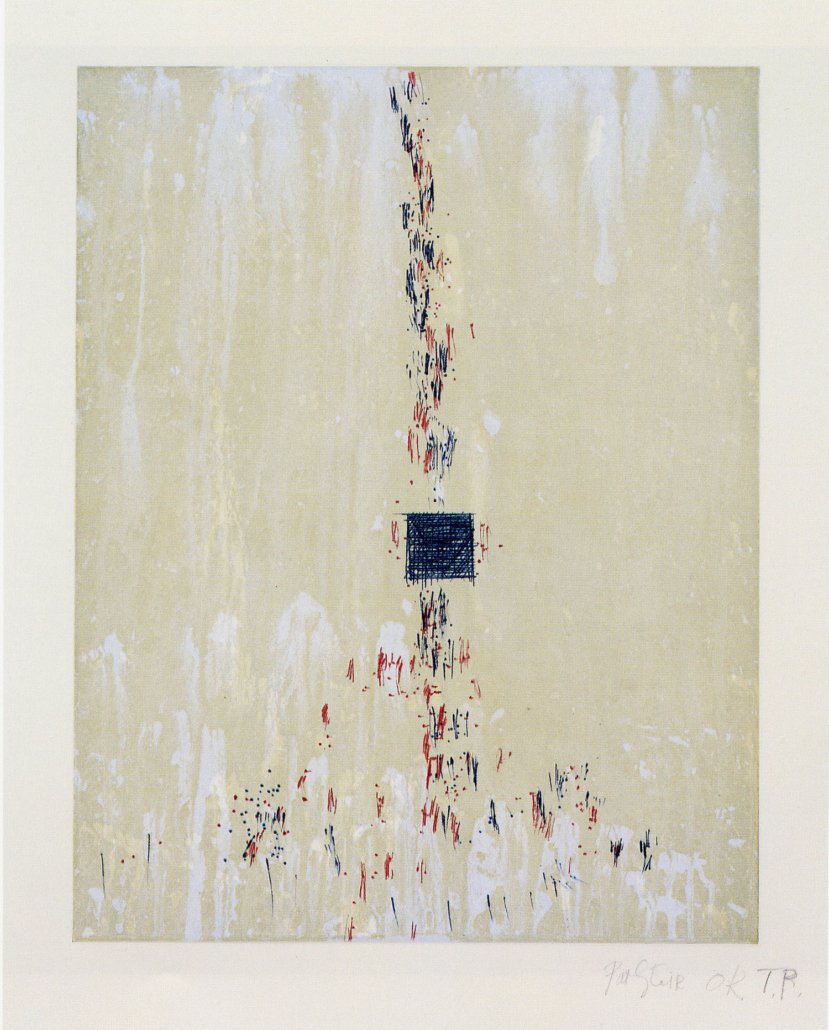Pat Steir
American, 1940
-
Steir was lauded in the early 1970s for her canvases featuring various iconographic symbols—most prominently roses crossed out with ‘X’ figures, inspired by Shakespeare’s famous aphorism, “A rose by any other name would smell as sweet” and Gertrude Stein’s retort, “A rose is a rose is a rose.” Of this act of effacement, the artist explains, “I wanted to destroy images as symbols. To make the image a symbol for a symbol. I had to act it out―make the image and cross it out.” This series marks Steir’s first engagement with questions of representation and semantic signification, issues she continues to explore. She was compelled to search for her own praxis that was both painterly and theoretical. The influence of Conceptual art, French philosophy, and East Asian art and thought moved her to begin creating room-size installations in the mid-1970s.In the late 1970s, Steir traveled extensively in the United States and Europe, where numerous galleries regularly presented her work. By the late 1980s, back in New York, Steir began to experiment with pouring and flinging layers of thinned paint onto canvas, releasing herself from conscious consideration of imagery and composition and allowing the indexical trace of her process to become the image itself. While her pouring process invites comparisons to Jackson Pollock, rather than laying her canvases on the floor, Steir paints from a ladder and works directly on unstretched canvas tacked to the studio wall. The delimited chance of this working method has since come to define Steir’s practice. Her painting methods incorporate delimited chance, with a studied and deliberate release of control developed through her study of Japanese and Chinese painting. Deeply inspired by Taoism and Buddhism, her working methods transcend the divide between figuration and abstraction. Intentionally deviating from the gestural flatness of the Abstract Expressionists, Steir instead explores a contemplative condition of unbound perception. In this way, she seeks to both portray and evoke a state of mind: rather than representing the sublimity of a waterfall or seascape, Steir’s paintings become charged spaces of transcendental content.
For five decades, Steir has exhibited widely in American and European museums. She recently completed two major suites of monumental, rigorous Waterfall projects: Silent Secret Waterfalls for the Barnes Foundation in Philadelphia (2019) and Color Wheel for the Hirshhorn Museum and Sculpture Garden, Smithsonian Institution, Washington, D.C. (2019–2021). Lévy Gorvy has shown her paintings with solo exhibitions in London (2016) and New York (2017), and in 2019 hosted Visible Traces (Mountain Air Water), an exhibition curated by Steir.
In 2013, the National Academy Museum, New York, exhibited Pat Steir: Blue River. In 2010, Drawing Out of Line traveled from the Museum of Art, Rhode Island School of Design, Providence, to Neuberger Museum of Art, Purchase, New York. In 2000, Dazzling Water, Dazzling Light traveled to the Butler Institute of American Art, Youngstown, Ohio, and the Des Moines Art Center, among other venues. Steir created site-specific installations Likity Split and Ghost Moon Mountain Water in 1998 for the Whitney Museum of American Art, New York, and P.S. 1 Contemporary Art Center, New York, respectively. Other major exhibitions include: The Irish Museum of Modern Art, Dublin (1994, 1996); Centre National d’Art Contemporain de Grenoble (1992); and Musée d’Art Contemporain de Lyon, France (1990), among others.
In 1988, Pat Steir Prints 1976–1988 opened at the Cabinet des Estampes, Musée d’Art et d’Histoire, Geneva, and traveled to the Tate, London. The prior year, the Rijksmuseum, Amsterdam presented Paintings 1981–1984; the Baltimore Museum of Art hosted Drawing Now: Pat Steir; and Kunstmuseum Bern opened Paintings and Drawings. In 1984, the Brooklyn Museum organized Pat Steir: The Brueghel Series (A Vanitas of Style), an exhibition that traveled to ten museums including the Dallas Museum of Art; Centre d’Art Contemporain, Palais Wilson, Geneva; Los Angeles County Museum of Art; Des Moines Art Center; and the Gemeentemuseum Den Haag, the Netherlands, among other venues. Form Illusion Myth: The Prints and Drawings of Pat Steir opened at the Spencer Museum of Art, University of Kansas, Lawrence, in 1983 and traveled to the California State University, Long Beach; Contemporary Arts Museum, Houston; The Wellesley College Museum; and the Brooks Memorial Art Gallery, Memphis.
Steir’s work has been included in hundreds of group shows and is held in the permanent collections of major museums worldwide including: Denver Art Museum; Fondation Cartier, Paris; Hirshhorn Museum and Sculpture Garden, Washington, D.C.; Louvre, Paris; the Metropolitan Museum of Art, New York; the Museum of Modern Art, New York; National Gallery of Art, Washington, D.C.; the Philadelphia Museum of Art; the Whitney Museum of American Art, New York; the Solomon R. Guggenheim Museum, New York; and Tate Gallery, London, among other institutions.
Steir is the recipient of numerous awards, including a Guggenheim Fellowship (1982), as well as grants from the National Endowment for the Arts (1976, 1973). In 1991, she was awarded an Honorary Doctorate of Fine Arts from the Pratt Institute, New York, and in 2001, she received the Boston University School for the Arts Distinguished Alumni Award. Steir received the Visionary Woman Award from the Moore College of Art & Design in 2015 and in 2016 was elected a member of the American Academy of Arts in Letters. In 2017, she was awarded the International Medal of Art by the United States Department of State.
Courtesy Lévy Gorvy



